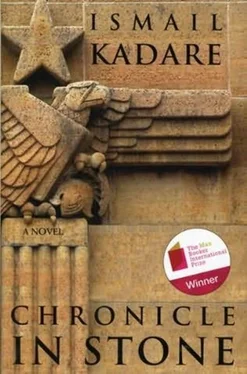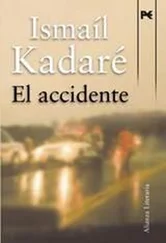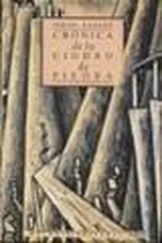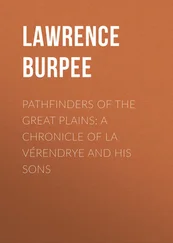Ismaíl Kadaré - Chronicle in Stone
Здесь есть возможность читать онлайн «Ismaíl Kadaré - Chronicle in Stone» весь текст электронной книги совершенно бесплатно (целиком полную версию без сокращений). В некоторых случаях можно слушать аудио, скачать через торрент в формате fb2 и присутствует краткое содержание. Жанр: Современная проза, на английском языке. Описание произведения, (предисловие) а так же отзывы посетителей доступны на портале библиотеки ЛибКат.
- Название:Chronicle in Stone
- Автор:
- Жанр:
- Год:неизвестен
- ISBN:нет данных
- Рейтинг книги:4 / 5. Голосов: 1
-
Избранное:Добавить в избранное
- Отзывы:
-
Ваша оценка:
- 80
- 1
- 2
- 3
- 4
- 5
Chronicle in Stone: краткое содержание, описание и аннотация
Предлагаем к чтению аннотацию, описание, краткое содержание или предисловие (зависит от того, что написал сам автор книги «Chronicle in Stone»). Если вы не нашли необходимую информацию о книге — напишите в комментариях, мы постараемся отыскать её.
Chronicle in Stone — читать онлайн бесплатно полную книгу (весь текст) целиком
Ниже представлен текст книги, разбитый по страницам. Система сохранения места последней прочитанной страницы, позволяет с удобством читать онлайн бесплатно книгу «Chronicle in Stone», без необходимости каждый раз заново искать на чём Вы остановились. Поставьте закладку, и сможете в любой момент перейти на страницу, на которой закончили чтение.
Интервал:
Закладка:
Briefly seduced by adventure, and having had a taste of the sky and of international dangers, the city had been stunned by it all and now withdrew into its ancient stones. Wind and rain were now vying to anaesthetise its jagged nerves. It was dazed. Its links to the sky had been permanently severed. The foreign planes that passed overhead no longer recognised it, or pretended not to see it. They flew high, leaving behind only a disdainful rumble.
One morning, after carefully closing the door behind her, Kako Pino went out into the street.
“Where are you off to, Kako Pino?” Bido Sherifi’s wife asked from her window.
“To a wedding.”
“A wedding? Who’s got it into his head to get married in times like these?”
“People marry in all kinds of times,” Kako Pino said.
The fact that Kako Pino was on her way to a wedding showed that the city could easily cope without a government. But as in any period of transition, these were uncertain times. The normal rules of life were suspended. The newspapers did not come out. No courts were in session. No more announcements, posters or ordinances appeared on the walls of the town hall. News, whether local or foreign, came only by word of mouth. The chief source was an old, hitherto unknown woman whose name suddenly spread far and wide in those faceless days. Her name was Sose, but most people called her “Old News”.
Ex-convicts, suspicious-looking men from the Highlands of Labëri, and other strangers wandered through the town. Everything was fleeting, unstable. The squares, streets and telegraph poles hoarded their secrets. Doors were manifestly mistrustful. The days were cold and without substance. Only the chimney stacks were fully alive.
It was then that Xhexho reappeared. The knock at the door fell on my head like a hammer blow. I wanted to hide, disappear, but it was impossible. Up the stairs she came, wheezing as always. Fear, gossip and news scurried before her like little black cats. There was no stopping them.
“Well, it’s Xhexho!” Grandmother said.
“Xhexho!” my mother said.
“How are you, Xhexho?” my father asked. “Where have you been all this time?”
Xhexho didn’t answer. As always, it was Grandmother she talked to.
“You see, Selfixhe? You see what God has sent us? I told you, Selfixhe, that black water would spurt from the springs. And sure enough, it did. Black. Have you seen the bomb-craters at Hazmurat? And Meçite? And Upper Palorto? Black water everywhere.”
“What is this black water?” I whispered to my mother.
“Bombs make craters in the ground, and they fill up with dirty water,” she said.
“But these people never learn,” Xhexho went on in her rasping, doom-laden voice. “Did you hear what they did? They stole that Englishman’s arm from that mu… mu-… how do you say it?”
“Museum,” my father said.
“Stole it, Selfixhe. No more, no less.”
“But who? What for?” my mother asked.
“A good question,” Xhexho whined. “Because they’re possessed, my girl. Because this is the age of the Evil One. Everything is upside down. Heaven dropped that Englishman’s arm down on us. Now you’ll see German hair and Chinese beards raining down on us, and then nails of Jews and Arabs’ noses…”
Xhexho went on and on. I stood aside, listening hard and trying to imagine a snowfall of nails, hair, beards and noses. I would ask Grandmother as soon as Xhexho left.
Maksut came by in the street, carrying a head I thought I recognised under his arm. It had been a long time since I’d seen his pretty wife. I would have to wait for spring to see her sitting out on her doorstep again. By this time they must have had a pyramid of severed heads at their house like the ones piled up by Genghis Khan. What was… garita doing now, I wondered. (The way she looked, her face, even her name now came to my mind only in part, like a hunk of bread gnawed by rats.)
Xhexho left. At first Qani Kekezi was suspected of stealing the Englishman’s arm, but then suspicion fell on Xivo Gavo the chronicler. Others thought it had been a smuggler from Varosh. The rumour was that he had sold the arm to a monastery on the other side of the mountain.
The city busied itself with petty affairs. That good-for-nothing Lame Kereco Spiri wandered the streets drunk, lamenting the passing of the brothel.
“They closed it, they closed it,” he kept saying, almost sobbing. “My warm little hearth, my feathered nest. They closed it on me! Woe is me! Where will I lay my head these winter nights?”
From time to time Llukan the Jailbird joined in the lament.
“My warm little hearth, my feathered nest,” Llukan would repeat mechanically.
“Get out of here! Have you no shame?” the old ladies shouted at them. “Get out of here!”
“Oh my lost little nest, where have you gone? O sole mio ,” Lame Kareco Spiri mumbled in bewilderment as he blew kisses to the old ladies.
“Get out of here, good for nothing! May lightning strike you, may the earth swallow you up!”
“ Doubt thou the stars are fire; doubt that the sun doth move …”
“Doubt that the sun doth move?” repeated Llukan.
“Go to hell, both of you.”
Things had really ground to a halt. People and things seemed to crawl along. Cattle grazed in the aerodrome field. Dino Çiço had suspended his research. His imagination was running dry.
In this somnolent state the city sought to re-establish contact with the outside world once more. To do so it used the old anti-aircraft gun in the citadel.
This old gun, kept in the citadel’s western tower since the days of the monarchy, could be seen from every corner of the city. Its long barrel, seeming slightly tired, pointed permanently at the sky. It was a familiar object as dear to everyone as its neighbour, the old clock, set into the other tower next to it. But with the passing years people had almost forgotten how to make use of that long tube and the handles, gears and winches built into the emplacement. From the time of its dedication (old men could still remember the ceremony organised by the city government, with patriotic speeches, music, bottles of beer and Lamçe the Gypsy who got thoroughly drunk and leapt from the fortress wall to his death in the street) the anti-aircraft gun had never once been fired.
After the bombing started, once people recovered from the initial shock and took cover in the shelters, the memory of the weapon flashed through the back of their minds. They recalled that the long metal tube, the levers and mechanism called “anti-aircraft gun”, were meant for just such occasions. It was a kind of revelation and everyone started asking:
“What about our anti-aircraft gun? Why doesn’t it come on?”
“You’re right, we do have an anti-aircraft gun. Why don’t we ever hear it?”
The initial disillusionment with our anti-aircraft defence was bitter indeed. When people came out of the cellars, they looked towards the western tower, where the silhouette of the weary, unmoved barrel stood out against the sky.
“It’s an outrage.” The expression, which as far as I knew was usually applied to women, and definitely not to weapons, was first uttered in the Addis Ababa Café, and was soon on everybody’s lips.
It was outrageous the old gun hadn’t been heard… If it had been a miserable little fire-cracker or some handgun of the kind infantrymen get as basic equipment, then it might be excused for being scared and upset at the sight of enemy aviation, but that long-limbed monster of a gun had been designed for just such eventualities and could not be forgiven for having let us down.
What people obviously held against it more than anything else was the length of its barrel. When I studied the gun with the help of Grandmother’s opera glasses I sometimes imagined I could read its thoughts. You often say of someone accused of a misdeed that he’s retreated into his shell, or that he’s shrunk away. But that poor gun could not hide or cringe, and had to stay sticking out in full sight of all.
Читать дальшеИнтервал:
Закладка:
Похожие книги на «Chronicle in Stone»
Представляем Вашему вниманию похожие книги на «Chronicle in Stone» списком для выбора. Мы отобрали схожую по названию и смыслу литературу в надежде предоставить читателям больше вариантов отыскать новые, интересные, ещё непрочитанные произведения.
Обсуждение, отзывы о книге «Chronicle in Stone» и просто собственные мнения читателей. Оставьте ваши комментарии, напишите, что Вы думаете о произведении, его смысле или главных героях. Укажите что конкретно понравилось, а что нет, и почему Вы так считаете.












